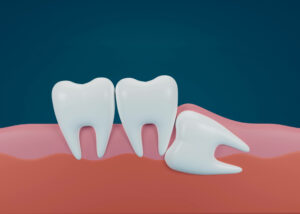
Wisdom tooth removal is a common dental procedure that addresses impacted or problematic wisdom teeth, which can cause pain, infection, and other dental issues. This post delves into why wisdom tooth extraction is sometimes necessary, what the procedure involves, and how to ensure a smooth recovery.
Why Wisdom Tooth Removal?
Wisdom teeth, or third molars, are the last set of teeth to develop. They usually emerge in the late teens or early twenties. Not everyone faces problems with their wisdom teeth, but when there is not enough space for them to grow properly, they can become impacted. Impacted wisdom teeth may grow at an angle, only partially emerge, or remain trapped beneath the gum and bone. This can lead to pain, swelling, jaw stiffness, and infection. Additionally, impacted wisdom teeth can cause damage to adjacent teeth and lead to gum disease and tooth decay.
The Procedure Explained
Wisdom tooth removal is typically performed under local anesthesia, sedation, or general anesthesia, depending on the complexity of the case and patient preference. The oral surgeon makes an incision in the gum tissue to expose the tooth and bone, removes any bone that blocks access to the tooth root, divides the tooth into sections if it’s easier to remove in pieces, removes the tooth, cleans the site of the removed tooth, stitches the wound to promote healing (if necessary), and places gauze over the extraction site to control bleeding and to help a blood clot form.
Recovery and Aftercare
Post-operative care is crucial for a smooth recovery. Patients are advised to rest for the first few days and use ice packs to reduce swelling. Pain management may include prescribed or over-the-counter pain relievers. It’s important to follow a soft food diet initially, gradually returning to normal eating as healing progresses. Patients should also avoid smoking, vigorous rinsing, or using a straw for the first few days to prevent dislodging the blood clot from the socket. Following the oral surgeon’s aftercare instructions is key to a quick and uncomplicated recovery.
Risks and Complications
As with any surgery, wisdom tooth extraction comes with risks, including dry socket, infection, damage to nearby teeth, and nerve damage. However, these complications are rare and can be minimized with proper care and following the oral surgeon’s guidance.
Wisdom tooth removal can significantly improve oral health and comfort when these teeth cause problems. Understanding the reasons for removal, what the procedure involves, and how to care for yourself afterward can help ease any anxieties about the surgery. If you’re experiencing discomfort or have been advised to have your wisdom teeth removed, consult with an oral surgeon to discuss your options and the best course of action for your specific needs.
Resources
- Centers for Disease Control and Prevention (CDC): For general oral health information, visit the CDC’s oral health section at www.cdc.gov/oralhealth.
- American Dental Association (ADA): The ADA offers extensive resources on dental procedures, including wisdom tooth removal. Their website, www.ada.org, provides patient information and guidance on oral health.
- Mayo Clinic: For detailed medical information on a wide range of health topics, including wisdom tooth removal, the Mayo Clinic’s website www.mayoclinic.org is a reliable source.
These websites are reputable sources for health information and can provide you with detailed guidance on wisdom tooth removal, recovery tips, and potential complications.
Learn more about our dental services and schedule your consultation today. All of our surgeons at Oral and Facial Surgery are board-certified by the American Board of Oral and Maxillofacial Surgery and, with locations in Hagerstown, Maryland and Chambersburg, you’re sure to find an office nearby. Call us in Maryland at 301-791-1700 or 717-264-7828 in Pennsylvania. We look forward to answering your questions!
The information provided on this website should not be used to diagnose or treat any medical condition and is not meant to take the place of professional medical advice. If you think you have a medical problem, please seek the advice of a physician. Call 911 for all medical emergencies.



